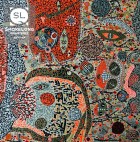Niamh and Hector exhibit a complex playfulness that from one angle looks carefree and generous but from another angle looks like existential boredom and fumbling grasps at connection more so than actual connection. Did this playfulness occur naturally as you drafted the story or did you use it intentionally to explore particular themes?
When drafting this story, I merged together several fragments, which seemed to be about the same two people who aren’t sure how to behave around each other. People are weird and relationships can be confusing and complex. Niamh and Hector don’t know how to handle what had happened to them so early on in their marriage—a time that was supposed to be the beginning of something new and exciting had a shadow cast over it. They try to wind each other up, as couples do, to varying degrees of success. They love each other and they bicker. They try to take some kind of action to help them make sense of the world. So, I think they’re trying to reconnect in order to make things good, to make things what they were once, but they can’t just ignore that things are different. I think this playfulness was naturally within those fragments, and then became more intentional throughout the redrafting and editing stage.
I love that Niamh used to be a casting director, and I love even more how this career relates to her character. If your writing practice could be personified, what kind of role would she cast it in?
I love this question, and I’m not sure how best to answer it.
I think my writing practice would fit well in a Christmas movie (I love Christmas movies). It would be the archetypal character who thinks they’re all that at the beginning of the film and then something—usually the spirit of Christmas—makes them realize the true meaning of Christmas.
When I draft a story, I usually get carried away by my own excitement. This results in a draft that I (wrongly) believe is amazing. But then I am visited by three ghosts redraft and edit and through however many, many versions I eventually learn the real meaning of the story.
Niamh and Hector attempt to appear as “woeless lovers,” but fall a bit short. An advancing romantic relationship is a great situation for exploring the tensions between fantasy, expectation, and reality. Does your work often explore this tension in intimate relationships?
Yes, definitely. I’ve always been interested in our perceptions of one another and I think relationships are a great way of exploring the mismatch between expectation and reality, or our perception of a situation and the real events unfolding.
I think most relationships would fall short of this idea of being “woeless lovers.” It’s a societal standard that someone decided must be upheld. Isn’t it exciting (or concerning, or intriguing, or …) when you’re in the supermarket and overhear a couple arguing? What are they bickering about? Why? Are they really arguing about something else?
I don’t mean this in a sinister way, but relationships make people say things or behave in ways they wouldn’t normally. They behave as Hector and Niamh do when they don’t know how to behave around one another; they pull furniture away from the walls, they pretend they don’t see the fresh cut roses lovingly arranged, they’ll dance around what is on their minds, what they really need to talk about.
Given how different we all are, the many different combinations of different people in varying relationships, and all the obstacles or scenarios we may face, there’s a lot to be explored.
What’s your current project?
I’m currently editing a full-length flash fiction collection called This Alone Could Save Us, which will be published by Ad Hoc Fiction in 2020. The collection focuses on the themes of change and human connection, and will feature a lot of work that hasn’t appeared in my earlier works. I’m also planning on writing a novel at some point, and I’ll be judging the February 2020 round of the Bath Flash Fiction Award. I can’t wait to read those stories!
What’s the best sentence you’ve read in the last year?
I think deciding the best of anything is always going to be difficult. I’m going to choose a sentence I’ve heard instead of read. It’s not decorous but it’s an important sentence, especially for our times. It’s from a really high-brow, intellectual TV show:
“Your belief is a belief; my existence is a reality.”
—Divina De Campo, RuPaul’s Drag Race UK, Season One



 The core workshop of SmokeLong Fitness is all in writing, so you can take part from anywhere at anytime. We are excited about creating a supportive, consistent and structured environment for flash writers to work on their craft in a community. We are thrilled and proud to say that our workshop participants have won, placed, or been listed in every major flash competition. Community works.
The core workshop of SmokeLong Fitness is all in writing, so you can take part from anywhere at anytime. We are excited about creating a supportive, consistent and structured environment for flash writers to work on their craft in a community. We are thrilled and proud to say that our workshop participants have won, placed, or been listed in every major flash competition. Community works.